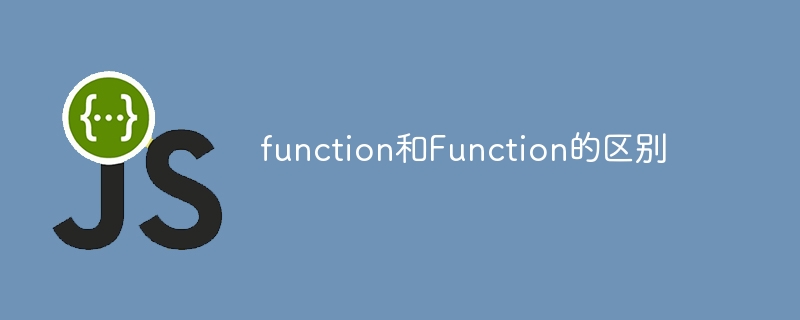

The difference between function and Function requires specific code examples
1. Overview
In JavaScript, function is a keyword used to define functions. Function is a constructor built into JavaScript, which is used to create new function objects. Although they are both used to create functions, there are some subtle differences in their usage.
2. Syntax
function functionName(parameters) {
// Function body
}
Among them, functionName is the name of the function, parameters is the parameter list of the function, and the function body contains the execution code of the function.
let functionName = new Function('param1', 'param2', '...','functionBody' );
Among them, functionName is the name of the function, param1, param2, etc. are the parameter lists of the function, and functionBody is the execution code of the function.
3. Differences
For example, the following code demonstrates the scope difference between a function created using the function keyword and a function created using the Function constructor:
function createFunction1() {
let a = 1;
return function() {
console.log(a);
}
}
let func1 = createFunction1();
func1(); // 输出1
let func2 = new Function('console.log(a)');
func2(); // 报错,a未定义For example:
function namedFunction() {
console.log('Named function');
}
let anonymousFunction = function() {
console.log('Anonymous function');
}
let anonymousFunction2 = new Function("console.log('Anonymous function');");
namedFunction(); // 输出:Named function
anonymousFunction(); // 输出:Anonymous function
anonymousFunction2(); // 输出:Anonymous function 4. Applicable scenarios
The function keyword is more commonly used and is the standard way to create functions. It is usually used to define and organize function blocks of code.
Function constructor has relatively few usage scenarios, and is more common in dynamically generating functions, dynamically compiling code, and parsing strings.
For example, you can use the Function constructor to compile and execute function code in the form of a string at runtime:
let strFunc = "console.log('Dynamic function');";
let dynamicFunction = new Function(strFunc);
dynamicFunction(); // 输出:Dynamic functionIt should be noted that due to the flexible use of the Function constructor, it may Causing security vulnerabilities or performance issues. In development, you should use the Function constructor with caution and try to choose the function keyword to define functions.
To sum up, there are some differences between function and Function in terms of definition, scope, form and applicable scenarios. For general needs to create functions, it is recommended to use the function keyword. For some special situations where functions need to be dynamically generated, you can consider using the Function constructor.
The above is the detailed content of The difference between lowercase function and uppercase Function. For more information, please follow other related articles on the PHP Chinese website!




